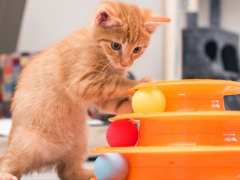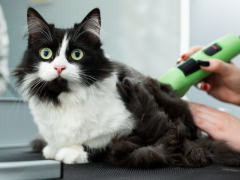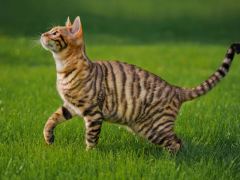
Wirestock Creators / Shutterstock.com
Vitamin D is an essential vitamin for cats. This means they need the right amount of vitamin D in their diets to stay healthy. Amongst other important roles, vitamin D is vital for your cat’s bone health, especially when they are growing. A diet that doesn’t contain enough vitamin D can cause bone weakness and deformities – such as rickets in kittens, or osteomalacia in adult cats.
Unlike people, cats can’t make vitamin D in their skin in response to sunshine, so they must obtain it in their food. A good quality commercial diet contains the right amount of vitamin D. But there are some circumstances where your cat might receive an imbalance.
Read on for everything you need to know about vitamin D for cats, from why it is important, to how to ensure your cat gets the right amount. It will also look at what happens if your cat eats too much (vitamin D poisoning), or too little (vitamin D deficiency).
About Vitamin D for Cats
Vitamins help your cat’s body to grow and work properly. Essential vitamins, like vitamin D, are ones your cat needs to stay healthy, but cannot make themselves – so they must get enough in their diets.
Two types of vitamin D are important for cats:
- Vitamin D2 (ergocalciferol): found in plants, fungi, and yeasts
- Vitamin D3 (cholecalciferol): found in animal sources such as fish (and fish oil), liver, beef, and egg yolks
Vitamin D plays an important role in many areas of your cat’s body, especially their bones:
- Absorption of calcium and phosphorous: without vitamin D, your cat cannot absorb calcium and phosphorus from their diet, no matter how much they eat.
- Healthy bones and teeth: by managing calcium and phosphorous, vitamin D is essential for healthy bones and teeth – especially in kittens. Too little (vitamin D deficiency) causes bone deformities and weaknesses – a condition called rickets in young animals or osteomalacia in adults.
- Strong muscles: vitamin D is important in both the growth and movement of your cat’s muscles.
- Healthy nervous system: vitamin D is essential for your cat’s brain and nerves to function properly.
- Strong immune system: vitamin D strengthens your cat’s immune system, helping them fight off illness and infection. It may also reduce inflammation.
How Can I Ensure My Cat is Getting Enough Vitamin D?

The best way to ensure your cat gets enough vitamin D is to feed a high-quality, complete, balanced diet. Kirsten McCarthy / Cats.com
The safest and easiest way to meet your cat’s vitamin D needs is to feed a high-quality, balanced, commercial diet.
All commercial cat foods that meet the American Association of Feed Control Officials (AAFCO) contain the recommended amounts of nutrients, vitamins, and minerals. You can check if your cat’s diet is complete by looking for the AAFCO statement on the label.
Thankfully, since the introduction of regulated commercial diets, nutritional diseases such as vitamin D deficiency have become rare. But, as a veterinarian, I have seen a sudden increase as home-cooked, boutique and raw diets have become more popular.
It is vital to ensure your cat receives a nutritionally balanced and complete diet, whatever you choose to feed. You can find the recommended amounts of vitamin D for growing and adult cats in the AAFCO Guidelines.
Should I Give My Cat a Vitamin D Supplement

Cats fed a complete diet do not need vitamin D supplements. Veera / Shutterstock
Cats who eat a complete and balanced diet do not need a vitamin D supplement, as they get enough in their food. In fact, giving your cat a vitamin D supplement could lead to an excess of vitamin D, which can be dangerous (see below for more about vitamin D toxicity). So, always consult with your veterinarian before giving your cat a supplement.
Vitamin D supplements are generally only recommended for cats diagnosed with a vitamin D deficiency (usually because of an inappropriate diet). Occasionally, a vitamin D supplement called Calcitriol may be prescribed for some cats with chronic kidney disease or hypocalcemia.
Vitamin D Deficiency
Cats get vitamin D from their food. Therefore, it is vital for your cat’s health that you feed them a complete and nutritionally balanced diet. If you aren’t sure, look for the AAFCO label on your cat’s food – this means it meets up-to-date nutritional guidelines. Vitamin D deficiency most commonly occurs in cats fed inappropriate diets, especially home-cooked or all-meat diets.
Without enough vitamin D, your cat cannot absorb calcium and phosphorous. These nutrients are particularly important for healthy bones. This is why insufficient vitamin D can lead to weak, deformed bones – rickets in kittens and osteomalacia in adult cats.
Rickets is commonly seen in kittens fed an inappropriate diet:
- Reluctance to play and jump
- Swollen joints
- Hunched back
- Skeletal deformities, including bowed legs
- Lameness
Osteomalacia is similar to rickets, but affects adult cats – especially those fed an all-meat diet. It causes weak, soft bones:
- Poor quality fur
- Pica (eating non-food items)
- Deformed spines
- Lameness
- Broken bones
Vitamin D deficiency can also cause problems with your cat’s teeth, muscles, nervous system, and immune system.
Treating Vitamin D Deficiency
Both rickets and osteomalacia are treated by correcting your cat’s diet and ensuring it contains enough vitamin D. This can usually be achieved simply by choosing a high-quality commercial diet. If caught early enough, kittens can recover before suffering irreversible damage. However, lasting deformities are common.
Cats with osteomalacia usually respond quickly to a change in diet but should be confined until their bones have regained strength, to prevent fractures.
Vitamin D deficiency is easily prevented by feeding a nutritionally complete diet. If you are feeding a home-cooked diet, consult a veterinarian with boarded nutritionally certification to help you ensure it contains everything your cat needs.
Vitamin D Toxicity

Vitamin D toxicity can be dangerous and requires immediate veterinary treatment. DwaFotografy / Shutterstock.com
Too much vitamin D can be dangerous for your cat. Vitamin D toxicity can be caused by:
- Vitamin D supplements
- Rat and mouse poison which contains cholecalciferol
- Improperly formulated diets (commercial and home-cooked)
- Licking psoriasis creams
Symptoms are non-specific and include vomiting, diarrhea, inappetence, increased thirst, and increased urination. However, blood tests tend to show high levels of calcium and phosphorous, which can lead to kidney failure.
Treating Vitamin D Toxicity
If your cat has recently ingested an overdose of vitamin D, your veterinarian may make them sick. They may also give activated charcoal to reduce how much vitamin D is absorbed from their gastrointestinal tract.
But if your cat is already showing symptoms, they may need to be hospitalized and treated with intravenous fluids, supportive care, and medications to reduce calcium and phosphorous levels. Sadly, vitamin D toxicity can have lasting effects, particularly on your cat’s kidneys. Some cats will need ongoing care and medication.
Frequently Asked Questions
Do cats get vitamin D from sunshine?
Vitamin D is known as the sunshine vitamin! This is because, in people, it is made in our skin when we are exposed to sunlight. But this doesn’t happen in cats – they can only get vitamin D from their diet. This means it is vital that you feed your cat a nutritionally complete diet to ensure they get everything they need.
How much is too much vitamin D for a cat?
Cats are very susceptible to vitamin D poisoning, with doses as low as 0.5mg/kg shown to cause toxicities. Ingestion of vitamin D supplements, rat and mouse poison, and even human psoriasis creams can all cause vitamin D toxicosis. But it can also happen gradually, in cats fed an inappropriate diet that contains too much vitamin D.
Can I give my cat human vitamin D?
Vitamin D can be toxic to cats, so you should never give your cat a human supplement. Cats fed on a nutritionally complete diet will get all the vitamin D they need. If you are worried your cat may be deficient in vitamin D, you should seek advice from your veterinarian.
-
AAFCO. (n.d.). AAFCO Methods for Substantiating Nutritional Adequacy of Dog and Cat Foods.
-
Zafalon, R. V. A., Ruberti, B., Rentas, M. F., Amaral, A. R., Vendramini, T. H. A., Chacar, F. C., Kogika, M. M., & Brunetto, M. A. (2020). The role of vitamin D in small animal bone metabolism. Metabolites, 10(12), 496. https://doi.org/10.3390/metabo10120496







